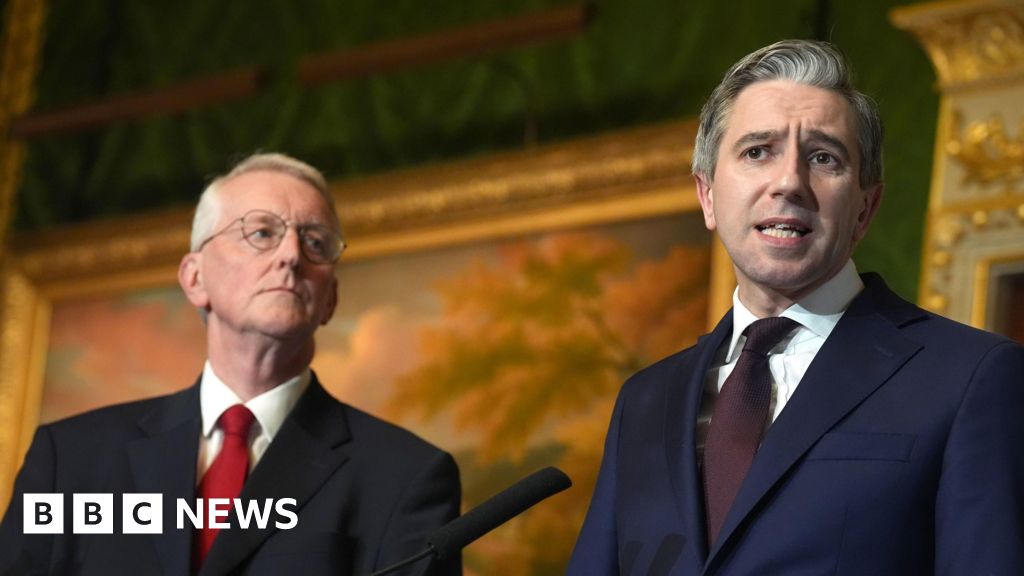BBC News NI
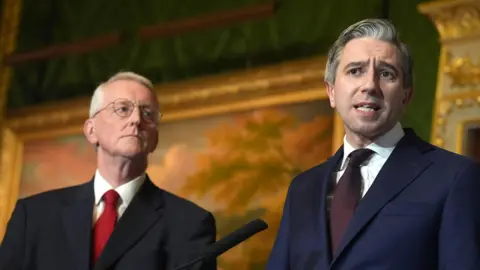 PA Media
PA MediaThe UK and Irish governments will know “within weeks” whether they can reach an agreement on Troubles legacy issues, the Tánaiste (Irish Deputy Prime Minister) has said.
Simon Harris said they have “made progress” on a way forward but he wanted to secure arrangements which are “vastly different”.
Secretary of State Hilary Benn said he has “listened carefully” to concerns over current structures for investigating Troubles killings and he remained committed to “fundamental reform”.
Both were speaking after a meeting of the British-Irish Intergovernmental Conference (BIIGC) at Hillsborough Castle.
The BIIGC was set up under the Good Friday Agreement and meets twice a year. It has not taken place in Northern Ireland since 2006.
Secretary of State Hilary Benn hosted Harris and Ireland’s Justice Minister Jim O’Callaghan.
Ministers discussed issues including the Labour government’s ongoing move to repeal the controversial Troubles Legacy Act.
Reaching an agreement
Labour intends to retain a new legacy body set up under the legislation – the Independent Commission for Reconciliation and Information Recovery (ICRIR).
A number of victims’ groups have called for the ICRIR to be scrapped, arguing it is not sufficiently independent to investigate killings during Northern Ireland’s decades-long conflict.
Harris said he would like to “reach an agreement between the two governments on what legacy mechanisms would look like”.
Speaking at the press conference, he added: “I think we will know within weeks whether it is possible to have a joint position between the two governments or not.
“I really hope it is. We’re both working in very good faith to try and bring that about.”
The tánaiste said that “far too many families” have “waited far too long for truth, for justice”.
“And that’s why I’m absolutely determined that we do everything that we possibly can to see if we can reach an agreement on a mechanism that is vastly different to the one available today,” he said.
Harris said that if an agreement was reached, he would “hope to be in a position then” to reconsider the Irish government’s legal challenge of the UK government over Troubles legacy issues.
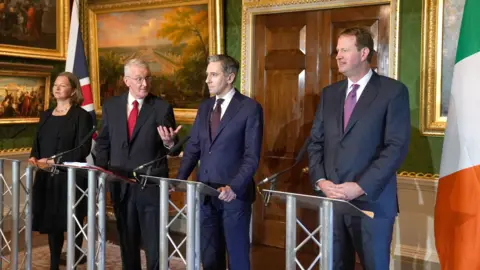 PA Media
PA MediaThe Secretary of State said he was committed to “absolutely fundamental reform” of the ICRIR, which he said was now investigating 50 cases.
“We have been in detailed discussion between the two governments on the nature of that fundamental reform because it will need to look very different, and I can assure you that it will,” he said.
But he said it was a “pragmatic decision” to retain the commission rather than abolishing it “only then to recreate something that would not look terribly dissimilar”.
“I can assure you I have listened very, very carefully to the criticisms that have been made to aspects of the structure and governance of ICRIR,” he added.
“And I’m taking them very seriously in the proposals that I’m putting together.”
Omagh bombing inquiry
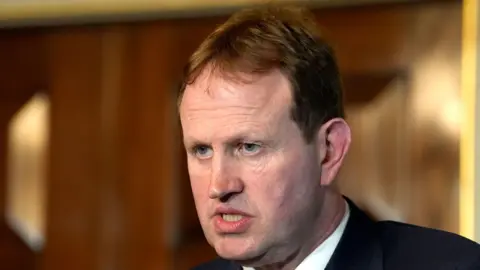 PA Media
PA MediaAt the press conference the Irish government’s Justice Minister, Jim O’Callaghan urged families to “have faith” in its pledge to cooperate with the Omagh bombing inquiry.
O’Callaghan said the Dublin administration was “fully committed” to facilitating the UK’s public inquiry into the 1998 bombing.
Families of the victims have said there was a lack of consultation on the Memorandum of Understanding (MoU) announced earlier this month.
O’Callaghan said he believed the MoU “will be satisfactory in order for the families to get the truth that they so much deserve”.
“I’d say to the families of the Omagh victims to have faith in what we have said we will do,” he added.
“The Irish government is fully committed to putting all relevant documentation before the inquiry, and we will cooperate with Lord Turnbull (inquiry chair) in his work.”
The conference also covered political stability, security, and other areas of bilateral cooperation.
It follows the UK-Ireland summit last month, where the two governments pledged to work closely to deliver security, investment and growth.
What happened at the last meeting?
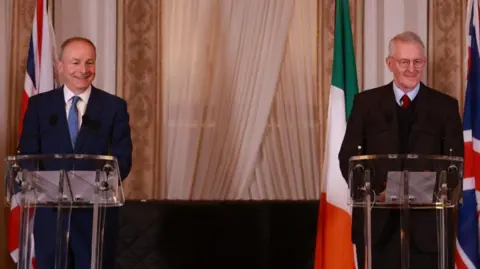 PA Media
PA MediaThe last BIIGC meeting, which was held in Dublin in December 2024, was overshadowed by the Irish general election.
During the meeting, British and Irish government ministers discussed a range of issues including the Troubles Legacy Act, the Omagh Bombing Inquiry and protecting the Common Travel Area.
It was the first BIIGC attended by Mr Benn since he became Northern Ireland secretary in July, after Labour won the UK general election.
What is the BIIGC?
It was designed to replace the Anglo-Irish Intergovernmental Council (AIIC) and the Intergovernmental Conference, which was established under the 1985 Anglo-Irish Agreement.
The BIIGC aims to promote bilateral co-operation on matters of mutual interest between the British and Irish Governments, including issues in relation to Northern Ireland.
The last time the meeting was held in Northern Ireland was at Hillsborough Castle in 2006, before another was held in Dundalk, County Louth, 2007.
No meetings of the BIIGC took place between 2008 and 2017, but it reconvened in 2018 following pressure on the then-Conservative government by Sinn Féin and the Irish government.
Since then, the meeting has alternated between London and Dublin.
